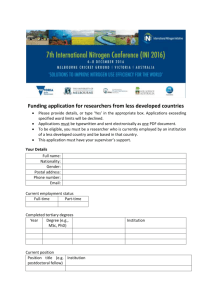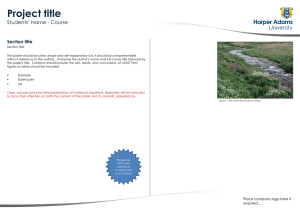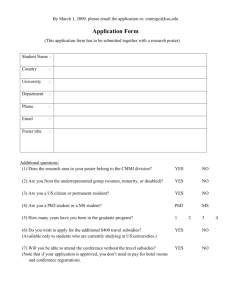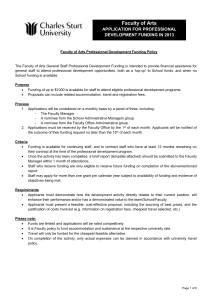Faculty of Health Sciences
advertisement
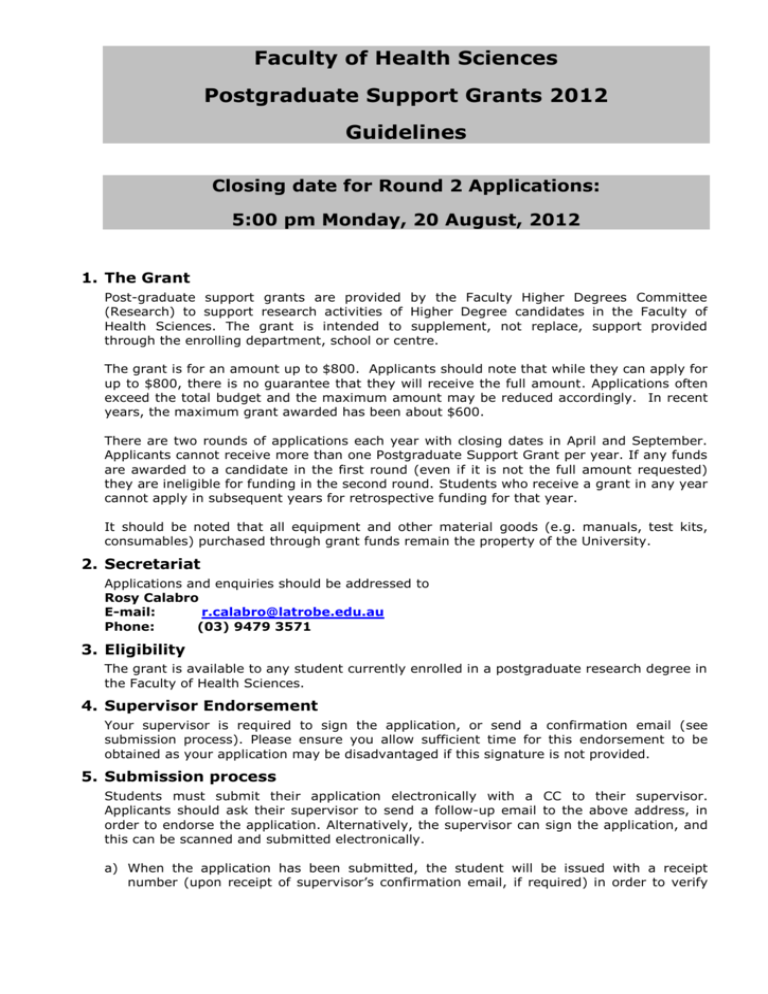
Faculty of Health Sciences Postgraduate Support Grants 2012 Guidelines Closing date for Round 2 Applications: 5:00 pm Monday, 20 August, 2012 1. The Grant Post-graduate support grants are provided by the Faculty Higher Degrees Committee (Research) to support research activities of Higher Degree candidates in the Faculty of Health Sciences. The grant is intended to supplement, not replace, support provided through the enrolling department, school or centre. The grant is for an amount up to $800. Applicants should note that while they can apply for up to $800, there is no guarantee that they will receive the full amount. Applications often exceed the total budget and the maximum amount may be reduced accordingly. In recent years, the maximum grant awarded has been about $600. There are two rounds of applications each year with closing dates in April and September. Applicants cannot receive more than one Postgraduate Support Grant per year. If any funds are awarded to a candidate in the first round (even if it is not the full amount requested) they are ineligible for funding in the second round. Students who receive a grant in any year cannot apply in subsequent years for retrospective funding for that year. It should be noted that all equipment and other material goods (e.g. manuals, test kits, consumables) purchased through grant funds remain the property of the University. 2. Secretariat Applications and enquiries should be addressed to Rosy Calabro E-mail: r.calabro@latrobe.edu.au Phone: (03) 9479 3571 3. Eligibility The grant is available to any student currently enrolled in a postgraduate research degree in the Faculty of Health Sciences. 4. Supervisor Endorsement Your supervisor is required to sign the application, or send a confirmation email (see submission process). Please ensure you allow sufficient time for this endorsement to be obtained as your application may be disadvantaged if this signature is not provided. 5. Submission process Students must submit their application electronically with a CC to their supervisor. Applicants should ask their supervisor to send a follow-up email to the above address, in order to endorse the application. Alternatively, the supervisor can sign the application, and this can be scanned and submitted electronically. a) When the application has been submitted, the student will be issued with a receipt number (upon receipt of supervisor’s confirmation email, if required) in order to verify that your application has been received. If you have not received a receipt within 48 hours of the application being sent, please contact the secretariat. b) It is the student’s responsibility to ensure that the applications are complete. The Faculty Office will not contact students should information be missing from their submission. However, students are very welcome to contact the secretariat for advice on their applications prior to the deadline. c) Applications must reach the Faculty Office by e-mail by the closing date indicated on this form. 6. Budget Applicants must ensure that an itemised budget is provided under Question 6. All budget requests must be clearly justified on the application form under Question 7. You do not need to provide supporting documentation for budget items with your submission. However, documentation, such as tax invoices, will be needed when accessing your funds from your Finance/Resource Manager. Some examples of budget justifications that have been considered favourably by reviewers in the past are attached for your information (see Attachment 1.) Funds must be expended within the calendar year of the grant application. If there are extenuating circumstances and the funds cannot be expended within the calendar year, a written request for extension must be sent to The Chair, Faculty Higher Degrees Committee for consideration. 7. Items that may be supported under this scheme include: a) Presentations at conferences. Support is available to attend conferences to deliver either poster or oral presentations related to the thesis. Applications must clearly state whether the applicant will be presenting and provide the location and dates of the conference, registration, travel and accommodation costs and evidence that an abstract has been accepted for presentation. If the applicant is still awaiting acceptance of an abstract, the timeline for acceptance of abstracts should be indicated. It is unlikely that an application will be funded if the applicant is not presenting unless there is a strong rationale for attendance. Such rationale should clearly link the specific aspects of the research project with aspects of the conference. Applications to present papers unrelated to the thesis will not be supported. Applications to refund costs of conferences attended in previous years will not be considered. b) Special materials required for the research project, including standardised test instruments and associated manuals. c) Attendance at training courses. If the training course overlaps with training that duplicates training available at the University, a strong justification for attending offcampus training should be included in the application. d) Field work: Funding for travel, VISA, permits, accommodation and office costs incurred, may be provided for students to conduct interviews or visit remote centres or facilities to collect data for their research project. e) If funding for assistance in data collection is requested, applicants must specify whether or not they will also be involved in the collection of data. f) Transcription of interviews. g) Purchase of items of research equipment. Applicants wishing to fund the purchase of any equipment or software should first ascertain if it is available through the Faculty Technical Services on extension 5637. h) Partial funding for costs of surveys. (Departments and Centres are normally expected to cover the costs of photocopying and postage. See 8b below.) i) Graphic design costs associated with poster presentations and PowerPoint presentations. j) Costs associated with publication of papers, eg. production of coloured figures/graphs, fees charged by journals. k) Honorarium payments to research participants (subject to evidence being provided that ethics approval has been obtained). l) Costs imposed by external authorities when seeking ethics approval. m) Thesis editing costs. Support may be provided for editorial assistance in production of the final draft of a thesis for ESL candidates. Support for editorial costs is only available once during candidature. 8. Items that are NOT normally supported under this scheme include: a) Travel to meet with supervisors. b) General office costs (telephones, facsimiles, unspecified photocopying). c) Software packages (e.g. MS Office, EndNote, SPSS, NVIVO) which should reasonably be provided through the computing resources of the school or department.* The University has site licenses for staff for software. Some of these licenses also cover students. If a Faculty owned computer being used by students then these computers can have MS Office SPSS NVIVO and Endnote installed on them for student use. However, if the student requires the software for their own personal computers (home desktop or laptop) then the following applies: MS Office, Endnote and SPSS: Students can obtain a software license from Information and Communications Technology (ICT). A student ID card is required. Please call ICT on 9479 1500 to confirm eligibility. NVIVO: If students wish to have NVIVO installed on their own personal computer, they will need to make their own arrangements. d) Equipment items of a general nature that should reasonably be provided through the equipment resources of the school Technical Services (e.g. computers, tape recorders, transcription equipment, general laboratory equipment, etc.)* e) Graphic design and editorial costs associated with the production of thesis. Note under item 7m that editorial assistance may be considered for ESL students. f) Thesis binding costs. g) Repairs to existing equipment. *The Committee may consider requests for equipment/software packages where the student is located a considerable distance from the campus or the applicant can demonstrate significant disadvantage and it is not feasible to borrow the equipment or to use existing computing facilities from the School/ Centre/ Faculty to undertake the necessary study. ATTACHMENT 1 Note: Please remove these pages and the Guidelines before submitting your application. Budget justification – Example 1 Training Attendance at a training course for computer assisted qualitative data analysis via Steps (La Trobe University). The volume of data to be analysed will be large (potentially >100 participants) and complex (unstructured interviews and discussion within focus groups), necessitating the use of a software package for the purpose of coding, manipulation, and retrieval of textual data. Quote: (Steps/ La Trobe University) $250.00 one day workshop; $100/hr individual database setup. Conference attendance: presentation of a paper or poster Presentation of a paper or poster or oral presentation at the ‘x’ conference in ‘x’ city, ‘x’ country, dates. The link between this conference and the research project is (justification to be provided). Evidence of abstract acceptance and costs involved are attached to this application. Student registration is $250.00, travel @$200.00, accommodation @$300, other costs $200.00. Attendance at a conference and not presenting: The rationale for attendance clearly links the specific aspects of the research project with aspects of the conference by (justification to be provided). Evidence of costs involved is attached to this application. Student registration is $250.00, travel @$200.00, accommodation @$300, other costs $200.00. Budget justification – Example 2 Transcription expenses Each research participant currently yields approximately between 5.5 and 7.5 hours of recorded interviews and field notes. I have found the care giver interviews particularly time consuming to transcribe. I would therefore like assistance in transcribing this large volume of data. I do not believe this would compromise my immersion in the data as I would still be required to transcribe the major portion of the work and have transcribed approximately half the data from my first two participants. I anticipate collecting data from several more participants this year. My budget is based upon a verbal quotation (18/4/2006) from ‘Transcripts Plus’, Surrey Hills. They currently charge $35/hour for transcription. Based on a clearly audible tape this equates to approximately $140 per hour of recorded data. Budget justification – Example 3 Video production A video is considered the most appropriate method for observing patient performance in this study for two reasons. Firstly, a video allows several clinicians to observe the patient at one time without overwhelming the patient during the assessment. Secondly, a video of the patient assessment controls for variability in patient performance across the two viewing sessions. Repeated live performances may not be identical, thus confounding any differences between the two methods of assessment. Transport for patients participating in the study Stroke patients have not yet been recruited for participation in this research however, it is likely that the patients may still be receiving inpatient rehabilitation or be living in special accommodation houses. Furthermore, the stroke patients invited to participate will be unable to drive a car and in the event that a family member is unwilling or unable to provide transport taxi vouchers will be offered. Budget justification – Example 4 Poster production A poster presentation is an enduring, visible and accessible format for presenting research work. The finished product will be able to be displayed at different locations following the presentation at the conference. This particular poster has had the added advantage of being developed collaboratively. It was considered that x would be able to design and deliver the professional result required for an international conference of the calibre of the 18th World Conference on xx. Therefore the budget for the poster was divided into two separate requirements of design and supply with the supply including full lamination for durability.
